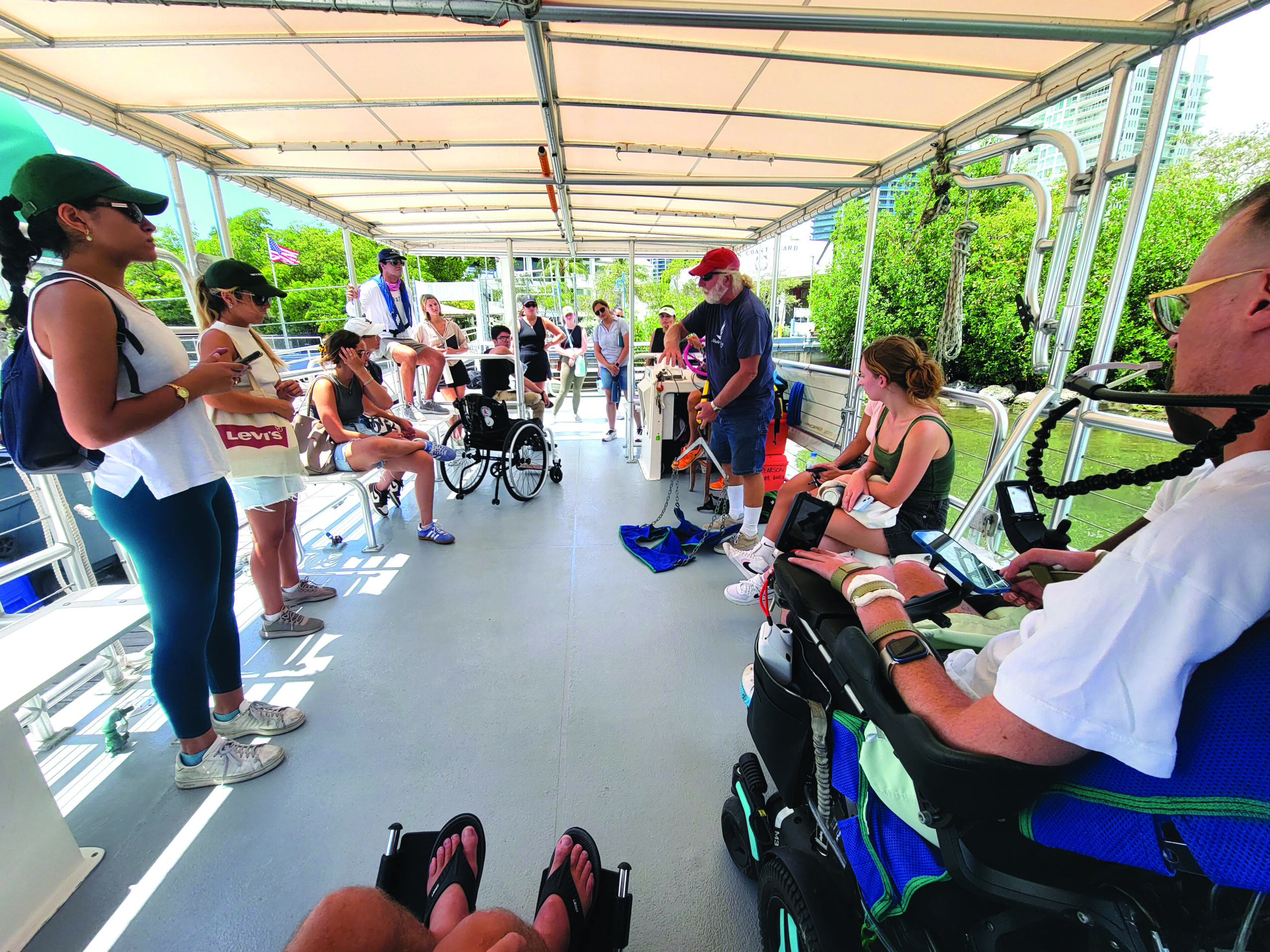The Miami Project’s Office of Education and Outreach, directed by David W. McMillan, Ph.D., links a variety of non-scientific stakeholders to The Miami Project’s dizzying diversity of cutting-edge science and technical expertise. Doing so requires the liaising of a single mission across a wide variety of audiences and settings that are not obviously related, from climatologists framing climate justice through the lens of spinal cord injury to architectural students on a sailboat contemplating the accessibility of floating structures.
The Miami Project believes in working with our local community to develop and implement strategies that can potentially treat paralysis. The Office’s outreach to Shake-A-Leg Miami (SALM), a local not-for-profit with a regional mission to provide ocean access for all, exemplifies the multi-modal education and outreach approach. Harry Horgan founded SALM after a sit-ski experience transformed his life post-SCI, but the organization did not have a Miami mission until the invitation of Dr. Barth Green brought Harry and his efforts to the Tropical Atlantic to harness the healing powers of the sea.
The Miami Project’s outreach strategy to SALM includes linking all three University of Miami campuses—the Medical Campus housing the Miller School, the Marine Campus housing the Rosenstiel School, and the Gables Campus housing the remaining majority of academic units. This complex outreach strategy has begun to bear fruit, with collaborators across various disciplines now integrating The Miami Project’s mission into their seemingly unrelated efforts. The Climate Resilience Academy (CRA) course, a flagship academic effort, aligned with Miami’s current and coming need for climate adaptation.
Via collaboration with Professor Katherine “Katie” Mach, Ph.D., the course now includes a module on Climate Justice where spinal cord injury is used as a teaching case of disproportionate vulnerability to climate hazards, complete with Miami Project research participants giving guest lectures from their wheelchairs from the perspective of lived-experience. Via collaboration with School of Architecture (SoA) professor Veruska Vasconez and instructor Sophie Juneau a design studio, titled “The Aquatic DisOrdinary”, was conducted where architecture students dove into the realm of inclusive design in the maritime environment, focusing on the accessibility of floating structures designed so people with paralysis can participate in coastal society.
The students visited SALM’s facilities to interact with current accessibility solutions in this context, and received a lecture from the deck of a wooden cat-ketch sailboat. Via collaboration with College of Engineering’s (CoE) professor Derin Ural, Ph.D. and instructor Nina Mariea Jean-Louis Amador, the novel Innovation, Technology, and Design (ITD) program now includes a Miami Project aligned effort in their unique multi-semester student-lead “design challenge” project. One of the ITD design challenge groups is employing the design thinking process to find solutions to boat and water ingress and egress challenges, focusing on the historic Freedom 20 keelboats designed by none other than Harry himself.
Finally, via collaboration with School of Communication (SoC) professor Trevor Green, journalism students learning about documentary filmmaking are showcasing the stories of paralyzed stakeholders overlapping with The Miami Project community, from adapted scuba diving to mixed abilities dancing via a profile of the Karen Peterson Dancers who have performed at a Miami Project event.
Expanding its reach beyond UM, the Office is excited to be collaborating with Dr. Suan Solman, D.P.M., R.Ph., a tetraplegic professor of medicine at Florida International University (FIU) Herbert Wertheim College of Medicine. Dr. Solman is spearheading a much-needed initiative to increase the accessibility of healthcare. Launched by an award from the Christopher and Dana Reeve Foundation titled “Educating Medical Students on Examining and Caring for People Living with Paralysis,” lectures and hands-on workshops on safe transfers and primary care are now integrated into medical and physician assistant program coursework. Dr. Solman pays people living with paralysis from SCI to participate in the workshop as real models, showcasing the power of realistic simulation training in instilling inclusive care in medical education. Dr. McMillan infuses the educational effort with The Miami Project expertise by partnering with Dr. Solman and delivering lectures on transfer techniques as well as inclusivity in the primary care setting, emphasizing the difference between cure and care. They continue to collaborate on the project, with plans to scale the workshops to other campuses to increase accessibility in the medical education setting.
Alongside these recent advancements, the Office’s engagement continues to nurture the next generation of neuroscience enthusiasts. The BrainBee, a neuroscience competition for teens, congratulates the 2024 Miami BrainBee winner Davud Skenderi and wishes him luck in the national competition. As part of the prize, Davud and his peers embarked on a tour of TMP’s facilities, bringing into reality the neuroscience concepts and techniques they learned about in theory. The BrainFair was once again a success at the Miami Dade County Public School (MDC-PS) Science, Technology, Engineering, Art and Mathematics (STEAM) Expo. This primary education neuroscience education and outreach event involves collaboration with Florida International University (FIU), St. Thomas University, and Barry University. Dr. McMillan and new outreach coordinator Alejandro Labrada also joined The Miami Project faculty member Gillian Hotz. Ph.D. in her KiDZ Neuroscience Center pedestrian safety education and outreach efforts.
At local primary schools, the WalkSafe and BikeSafe events emphasize the unique pedestrian safety concerns faced by many wheelchair users and discuss some of the similarities and differences between bicycle and wheelchair infrastructure solutions.

